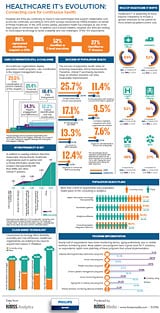Philips survey reveals clinical improvements in population health efforts are key priorities driving health IT investments
March 3, 2016
Las Vegas, Nev. – A new health care leadership survey released today by Royal Philips (NYSE: PHG; AEX: PHIA) reveals that a majority of health systems have already implemented population health management programs as they seek to improve patient outcomes. Additionally, driving measurable clinical improvements and ensuring interoperability remain the focus of health information technology (HIT) investments in 2016. These investments are focused on enhancing electronic medical record (EMR) functionality and connecting data across clinical systems within the health system to provide a broader picture of individual patients and better manage populations. Conducted by HIMSS Media on behalf of Philips and announced at the 2016 Annual HIMSS Conference and Exhibition, the survey of 105 health care IT leaders sought to determine how health leaders are prioritizing technology investments and addressing population health management. Of the 105 respondents, 85 percent represent either standalone hospitals or integrated delivery networks (IDNs). Three quarters of participants are in C-level positions or IT leaders, and 27 percent are clinically focused. “The transition to value-based care is driving an increasing number of health IT challenges that can be addressed by innovative connected solutions that spur collaboration between providers and patients across the entire health continuum,” said Jeroen Tas, CEO, Connected Care and Health Informatics, Philips. “The data from this survey reinforces what we hear every day from our customers that ensuring the integration of data across the enterprise and managing populations is critical to delivering better care.” Philips’s goal when building new technologies is to ensure everything can interoperate within the health system. Philips’ own portfolio depends on the free flow of an individual's health information from distinct systems. In fact, more than a dozen leading health care providers, hospitals, technology and consumer advocacy groups, including Philips, have agreed to implement federally recognized, national interoperability standards. For more information on the initiative, please visit >www.healthit.gov/commitment. The full text of Philips’ Interoperability Pledge can be found at HealthIT.Gov. As health care moves from being fragmented and episodic to being coordinated and continuous, population health management efforts are critical to making this transition. More than two-thirds of respondents already have population health programs in readmissions, acute care and patient education and more than half have chronic care programs. Notably, when asked where they planned to spend resources in the near future, respondents listed mobile wellness monitoring (52.5 percent), aging well (46.5 percent) and home monitoring devices (45.5 percent) as their top priorities. Key Survey Findings: To see how Philips is already addressing all of these key challenges visit the Philips booth (#3416) at the Healthcare Information and Management Systems Society (HIMSS) 2016 Annual Conference and Exhibition, taking place Feb. 29 – Mar. 4, at the Sands Expo in Las Vegas, Nevada. For updates, follow @PhilipsLiveFrom or visit www.philips.com/HIMSS for more information on Philips’ presence at #HIMSS16.

Infographic
For further information, please contact:
Kathy O’Reilly
Philips Group Communications
Tel.: +1 978-659-2638
E-mail: Kathy.Oreilly@philips.com
Twitter: @kathyoreilly
About Royal Philips
Royal Philips (NYSE: PHG, AEX: PHIA) is a diversified health and well-being company, focused on improving people’s lives through meaningful innovation in the areas of Healthcare, Consumer Lifestyle and Lighting. Headquartered in the Netherlands, Philips posted 2015 sales of EUR 24.2 billion and employs approximately 104,000 employees with sales and services in more than 100 countries. The company is a leader in cardiac care, acute care and home healthcare, energy efficient lighting solutions and new lighting applications, as well as male shaving and grooming and oral healthcare. News from Philips is located at www.philips.com/newscenter.
